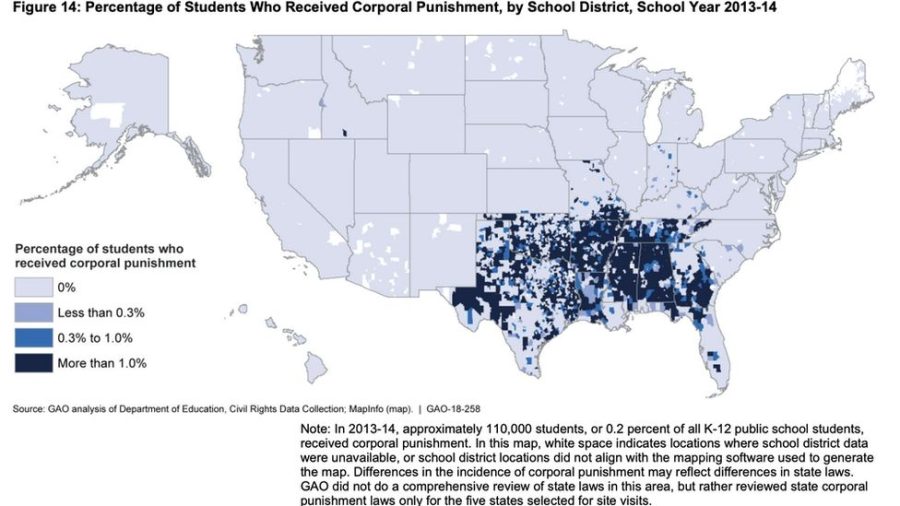Corporal Punishment in Schools
This graph shows the 19 states that still are actively using corporal punishment as a way to punish students.
In 2012, a video of a principal hitting a 5-year-old boy went viral, reintroducing the debate of corporal punishment.
The video runs almost parallel to the landmark Supreme Court case of James Ingraham. When 14 year old Ingraham was sent to the principal’s office for being rowdy in 1977, he was pinned down and received 20 swats with a paddle. He was unable to attend school for 10 days afterwards due to bruises, and was required to seek medical attention due to the severity of the injuries. Outraged, his parents went to the court on account of “cruel and unusual punishment.” The Ingrahams lost the case, with the court saying that “cruel and unusual punishment” was designed to be for punishment of criminals by the government.
“I could never imagine any teacher at Triton even thinking about hitting us,” said junior Emma Campbell. “I think that bad behavior should have consequences, but not physical, especially in today’s day and age.”
To us Vikings, the idea of one of our teachers hitting us with a paddle seems outlandish and outdated, but it is in fact still a reality in public schools in 19 states, as well as being legal in private schools in 48 states. Due to the outcome of the Ingraham v. Wright case in 1977, schools are still allowed to dole out corporal punishments to students.
Many students have heard horror stories from their parents or grandparents, saying that they used to get hit with a ruler in the knuckles. Julie Scarfo, one of Triton’s secretaries, said “My mother used to get hit with a ruler by the nuns.” It doesn’t seem like something that would be legal today. But surprisingly, it is.
For many students, school is supposed to be a safe space. Triton serves as a place where students are able to be educated. For some unfortunate students , school is safer than their homes. However, when we walk through the school doors every day, we hand over some of our rights. We don’t have unlimited freedom of speech (without consequences,) and we are allowed to be searched and property seized with “reasonable suspicion.” And while at school in one of 19 states that allow for corpral punishment, students are allowed to be hit.
The American Academy of Child & Adolescent Psychiatry (AACAP) describes corporal punishment as “a discipline method in which a supervising adult deliberately inflicts pain upon a child.” This will often be carried out by slapping, spanking, or hitting a child.
A glaring issue is that this kind of behavior is not allowed outside of schools, and is quite literally a crime. In Massachusetts, if an average adult were to assault a person, they would be fined “a minimum of 90 days in jail and a $500 fine, up to a possible 2.5 years in jail and a $5,000 fine,” according to Urbelis Law LLC. By allowing corporal punishment, the govenment is giving teachers or supervising adults rights that would not be acceptable outside of school grounds. Assault is an arrestable crime, but the government continues to allow it to happen to children today.
Not only can corporal punishment physically harm a child, but it can mentally harm a child as well. “[Children] may also fail to develop trusting, secure relationships with adults and fail to evolve the necessary skills to settle disputes or wield authority in less violent ways,” says the AACAP. Children who have been a victim to corporal punishment are more likely to repeat the same behavior. “I think that bad behavior should have consequences, but not physical, especially in today’s day and age,” said Campbell.
The ruling of the Ingraham v. Wright case declared “reasonable discipline at school doesn’t violate the Constitution.” While it is not (technically) against the Constitution, it is illegal outside of schools. The Ingrahams had tried to sue on the grounds of “cruel and unusual punishment.” The Supreme Court ruled that “cruel and unusual punishment” was designed to protect criminals from the government, and wasn’t for school children. While this is meant for criminals, it should be a standard for all people.
At Triton, other disciplinary actions will be put in place if some issue were to arise. Some of the Triton teachers have been through “restraint training” in the case of a fight.
“There are certain teachers in the building that have to get trained in case of a fight… It’s a deescalation,” said Triton’s vice principal Scott Brennan. “It is teaching them how to calm a person down.” In place of corporal punishment, students might get detention or suspention.
The outcome of the Ingraham v. Wright case is disturbing, especially due to the fact that there has been no thoughts to ban corporal punishment on a federal level. There was a chance after the video in 2012, but no further effort has been made to make this illegal.

Oh hey, didn’t see you there! I am Haleigh Harris, a junior at Triton High School. I am entering my 10th year of playing softball, my 4th year of tournament...






